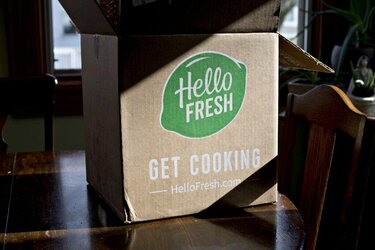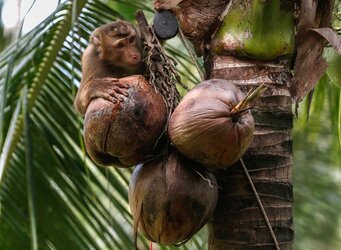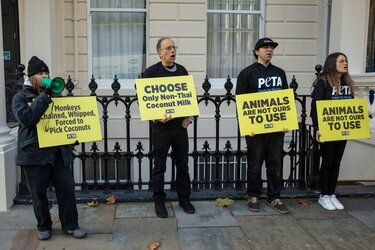HelloFresh to Stop Buying Coconut Milk From Thailand Amid Claims of Monkey Labor
The New York Times (archive.ph)
By Christine Chung
2023-03-16T16:20:22

HelloFresh, based in Berlin, delivers meal kits with ingredients measured out for its recipes. Credit...Daniel Acker/Bloomberg
HelloFresh, the German meal kit company, announced it would stop using coconut milk from Thailand this year, after allegations by the animal rights advocacy group PETA of the use of forced monkey labor in the coconut industry there.
Abby Dreher, a spokeswoman for HelloFresh, confirmed that “out of an abundance of caution” the company had decided not to buy coconut milk from Thailand starting later this year. The decision was made in December and was made public last week.
Walmart, Costco and other large American retailers have halted sales of Chaokoh coconut milk, a Thai brand, but HelloFresh has pledged to stop using coconut milk from Thailand entirely.
The announcement, earlier reported by Axios, comes after People for the Ethical Treatment of Animals published a report in November claiming monkeys were being abused at dozens of coconut retrieval operations that it said its investigators had visited in nine provinces in Thailand. PETA has long claimed that monkeys in Thailand are forced to climb tall trees for hours and to pick coconuts that will be used to make products such as coconut milk, flour and oil.

A monkey learns to collect coconuts for agriculture during a training session at the monkey school in Surat Thani, in southern Thailand.Credit...Chaiwat Subprasom/LightRocket, via Getty Images
PETA also claims that young monkeys are taken from their families to support the harvest. Abducting a wild animal is illegal in Thailand. The Thai government did not immediately respond to a request for comment on Tuesday.
In the report, PETA said that two of HelloFresh’s suppliers in Thailand relied on the labor of exploited monkeys. The New York Times was unable to confirm details of the PETA investigations independently.
“We have been in an ongoing dialogue with PETA ever since and continue to remind our suppliers, from whom we received written confirmation that they were not using monkey labor in their supply chain, of our high standards,” Ms. Dreher said. “Under no circumstances do we tolerate any form of animal abuse in our supply chain.”
In an email to PETA that was obtained by The New York Times, HelloFresh confirmed last month that it would stop buying Thai coconut milk by the summer of 2023 and would seek new suppliers based outside of Thailand.
Edwin Wiek, the founder of Wildlife Friends Foundation Thailand, a nonprofit that runs a center for wild animals found in captivity, estimates that Thai farmers keep a total of 4,000 to 5,000 monkeys.
Mr. Wiek said about two-thirds of those monkeys were used for labor. But, he added, the overall number of captive monkeys in the country had fallen in recent years, now about a third of what it was three years ago. He estimated that less than one percent of the county’s coconut harvest is produced using monkey labor.
While he said he did not condone monkey labor, he felt that PETA’s characterization of the conditions on Thai coconut farms made them appear more cruel than they are in reality. In most cases, he said, monkeys live with the farmers they work with and are treated as pets.
More than 25,000 retailers in the United States and Europe have stopped selling Thai coconut brands since PETA accused them of using forced monkey labor, the country’s embassy in the United States said last year.
HelloFresh, founded in Berlin in 2011, delivers meal kits with ingredients measured out for its recipes. The company, which operates in more than a dozen countries, offers meals advertised as Thai curries featuring coconut milk.
Chaokoh’s manufacturer, Theppadungporn Coconut Company, did not immediately respond to a request for comment on Tuesday.

PETA supporters stood outside the Thai Embassy in London last November to call on the Thai ambassador to push to end the use of monkey labor in Thailand’s coconut industry.Credit...Mark Kerrison/In Pictures, via Getty Images
Moira Colley, a PETA spokeswoman, said in a statement that the group’s goal was to “push the industry away from using and abusing monkeys.”
PETA is encouraging consumers to purchase products made from coconuts grown outside Thailand, instead encouraging harvests from the Dominican Republic, India, Indonesia, the Philippines and Vietnam. From 2017 to 2021, the annual export value of coconut milk from Thailand was more than $37 million, according to the government’s figures.
Three types of macaque monkeys can be bred in Thailand for commercial purposes, with permission from the Department of National Parks, Wildlife and Plant Conservation. In Thailand, anyone who wants to keep a monkey must also apply for permission. Those convicted of having a monkey without a permit can be fined up to about $1,158 or imprisoned for up to four years. Monkey owners found to be abusing their animals face prison sentences of up to two years.
In a study published in 2021 in the Journal of Applied Animal Behavior Science, researchers interviewed 89 coconut farmers working in three provinces in Thailand. They found that the macaque monkeys worked every day of the week and “typically climbed more than 50 coconut trees” to harvest between 500 and 1,000 coconuts each day.
The Thai embassy told Axios last week that “both the Thai government and the industry are making sure that coconut milk exported from Thailand is not obtained from the use of monkey labor.”
In a government document from last August, the embassy said it was establishing a program, called “Monkey Free Plus,” that would “not only certify coconut plantations on food safety system but also assure that monkeys are not used for harvesting.” The embassy also said it was “promoting hybrid dwarf coconut trees for new planting,” whose short trunks meant that harvesting coconuts would “no longer require monkey labor.”
Mike Ives and Ryn Jirenuwat contributed reporting.
Christine Chung is a travel reporter for The Times. She previously covered breaking news. She joined The Times in November 2021. @chrisychung
The New York Times (archive.ph)
By Christine Chung
2023-03-16T16:20:22

HelloFresh, based in Berlin, delivers meal kits with ingredients measured out for its recipes. Credit...Daniel Acker/Bloomberg
HelloFresh, the German meal kit company, announced it would stop using coconut milk from Thailand this year, after allegations by the animal rights advocacy group PETA of the use of forced monkey labor in the coconut industry there.
Abby Dreher, a spokeswoman for HelloFresh, confirmed that “out of an abundance of caution” the company had decided not to buy coconut milk from Thailand starting later this year. The decision was made in December and was made public last week.
Walmart, Costco and other large American retailers have halted sales of Chaokoh coconut milk, a Thai brand, but HelloFresh has pledged to stop using coconut milk from Thailand entirely.
The announcement, earlier reported by Axios, comes after People for the Ethical Treatment of Animals published a report in November claiming monkeys were being abused at dozens of coconut retrieval operations that it said its investigators had visited in nine provinces in Thailand. PETA has long claimed that monkeys in Thailand are forced to climb tall trees for hours and to pick coconuts that will be used to make products such as coconut milk, flour and oil.

A monkey learns to collect coconuts for agriculture during a training session at the monkey school in Surat Thani, in southern Thailand.Credit...Chaiwat Subprasom/LightRocket, via Getty Images
PETA also claims that young monkeys are taken from their families to support the harvest. Abducting a wild animal is illegal in Thailand. The Thai government did not immediately respond to a request for comment on Tuesday.
In the report, PETA said that two of HelloFresh’s suppliers in Thailand relied on the labor of exploited monkeys. The New York Times was unable to confirm details of the PETA investigations independently.
“We have been in an ongoing dialogue with PETA ever since and continue to remind our suppliers, from whom we received written confirmation that they were not using monkey labor in their supply chain, of our high standards,” Ms. Dreher said. “Under no circumstances do we tolerate any form of animal abuse in our supply chain.”
In an email to PETA that was obtained by The New York Times, HelloFresh confirmed last month that it would stop buying Thai coconut milk by the summer of 2023 and would seek new suppliers based outside of Thailand.
Edwin Wiek, the founder of Wildlife Friends Foundation Thailand, a nonprofit that runs a center for wild animals found in captivity, estimates that Thai farmers keep a total of 4,000 to 5,000 monkeys.
Mr. Wiek said about two-thirds of those monkeys were used for labor. But, he added, the overall number of captive monkeys in the country had fallen in recent years, now about a third of what it was three years ago. He estimated that less than one percent of the county’s coconut harvest is produced using monkey labor.
While he said he did not condone monkey labor, he felt that PETA’s characterization of the conditions on Thai coconut farms made them appear more cruel than they are in reality. In most cases, he said, monkeys live with the farmers they work with and are treated as pets.
More than 25,000 retailers in the United States and Europe have stopped selling Thai coconut brands since PETA accused them of using forced monkey labor, the country’s embassy in the United States said last year.
HelloFresh, founded in Berlin in 2011, delivers meal kits with ingredients measured out for its recipes. The company, which operates in more than a dozen countries, offers meals advertised as Thai curries featuring coconut milk.
Chaokoh’s manufacturer, Theppadungporn Coconut Company, did not immediately respond to a request for comment on Tuesday.

PETA supporters stood outside the Thai Embassy in London last November to call on the Thai ambassador to push to end the use of monkey labor in Thailand’s coconut industry.Credit...Mark Kerrison/In Pictures, via Getty Images
Moira Colley, a PETA spokeswoman, said in a statement that the group’s goal was to “push the industry away from using and abusing monkeys.”
PETA is encouraging consumers to purchase products made from coconuts grown outside Thailand, instead encouraging harvests from the Dominican Republic, India, Indonesia, the Philippines and Vietnam. From 2017 to 2021, the annual export value of coconut milk from Thailand was more than $37 million, according to the government’s figures.
Three types of macaque monkeys can be bred in Thailand for commercial purposes, with permission from the Department of National Parks, Wildlife and Plant Conservation. In Thailand, anyone who wants to keep a monkey must also apply for permission. Those convicted of having a monkey without a permit can be fined up to about $1,158 or imprisoned for up to four years. Monkey owners found to be abusing their animals face prison sentences of up to two years.
In a study published in 2021 in the Journal of Applied Animal Behavior Science, researchers interviewed 89 coconut farmers working in three provinces in Thailand. They found that the macaque monkeys worked every day of the week and “typically climbed more than 50 coconut trees” to harvest between 500 and 1,000 coconuts each day.
The Thai embassy told Axios last week that “both the Thai government and the industry are making sure that coconut milk exported from Thailand is not obtained from the use of monkey labor.”
In a government document from last August, the embassy said it was establishing a program, called “Monkey Free Plus,” that would “not only certify coconut plantations on food safety system but also assure that monkeys are not used for harvesting.” The embassy also said it was “promoting hybrid dwarf coconut trees for new planting,” whose short trunks meant that harvesting coconuts would “no longer require monkey labor.”
Mike Ives and Ryn Jirenuwat contributed reporting.
Christine Chung is a travel reporter for The Times. She previously covered breaking news. She joined The Times in November 2021. @chrisychung
